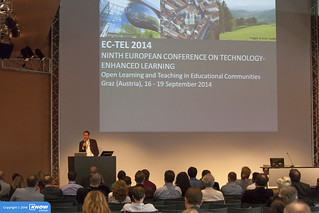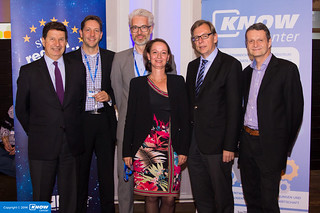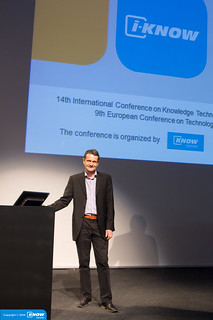Breaking out of the Filter Bubble
Some of our recent work has started to look at algorithms that should spark more creative search processes on the Web rather than leading us further along the well traveled paths. The OMFix project (‘Overcoming Mental Fixation by switching the internal spotlight: stochastic modeling of creative cognition in the lab and on the Web’) is an Austrian Science Fund project in cooperation with Dietrich Albert and Paul Seitlinger from TU Graz.
In line with this, I recently gave a “One Minute Lecture” on Breaking out of the Filter Bubble.
EC-TEL and I-Know 2014 in Graz
This year I acted as a general chair of EC-TEL 2014 which took place in Graz. It was nice to return and it was even nicer that I-Know 2014 was collocated with EC-TEL so that we had loads of great talks and I met many old colleagues and friends.
The collocation of the conferences also meant we did have more keynoters than usually. Bernardo Huberman (from HP Labs, on the left) and Etienne Wenger (on the right) joined us for the conference reception.
I especially enjoyed Etienne Wenger’s opening keynote who gave us some nice tasks to work on during the conference.
All in all, it was again a great conference. I am looking forward to seeing all again next year!
Scaling Up Learning for Sustained Impact – Springer Book is Out!

Scaling Up Learning for Sustained Impact
Scaling Up Learning for Sustained Impact – the proceedings of the 8th European Conference on Technology-enhanced Learning (EC-TEL) – have been published by Springer. I co-edited the book together with Davinia Hernández-Leo, Ralf Klamma and Andreas Harrer.
The book makes available all the selected papers we had at EC-TEL this year. This was a great effort by all programme committee members as we had a record number of 194 submissions in the review categories this year leading to 542 reviews that were performed.
We therefore had an acceptance rate for full papers of 22.8%. I think this shows that EC-TEL has become a great quality conference over the years.
I thank all the co-organizers as well as all members of the programme committee for such a great effort.
The book can be downloaded from the Springer Link Library: http://link.springer.com/book/10.1007/978-3-642-40814-4
Interview in the Austrian Radio Ö1
I was interviewed by the Austrian Radio Progranmme “Digital.Leben” (Digital Life) about the EU Project Learning Layers. A short sequence was now broadcasted in the latest programme.
Wissen teilen – Mitarbeiter/innen als unterschätzte Know How-Träger
(in German)
Learning Layers visits Doctors and Construction Workers
Research projects on Information and Communication Technologies are often being criticized for overly emphasizing technical issues at the expense of considerations for where and how the technologies should be employed. The Learning Layers project is quite different in this respect as only roughly half of the overall budget will go into researching and developing technology. 
The other half will be spent on gaining a deep understanding of the application fields and the practice of people, as well as the potential business opportunities and models.
The first 4 months of the project have therefore put an emphasis on establishing connections and gaining an understanding of the two application domains we are targeting, Health Care and Building and Construction. In January, we visited our partners in the Northern German Building and Construction Industry, such as Bau ABC in Rostrup and the Network for Sustainable Building and Construction in Verden.
As the pictures show, we not only held talks there, but got the opportunity to really experience the work and learning settings from a close distance.
In February, we then visited our partners in the Health Care sector in the UK. We visited one of the largest General Health Care Practices in the UK, The Ridge Medical Practice in Bradford as well as the NHS Bradford and Airedale.
Apart from the obvious differences of the two domains, it was also surprising to discover some striking similarities. Learning at the workplace and in and around work practices plays an important role in both settings. Making experiences and reflecting on those was one of the predominant modes of learning that was reported, and the need to scale these individual learning experiences to broader scope was clearly given. However, it also became quite clear that in both domains economic pressures for reducing slack time are immense. Sometimes we got the impression that with this focus on performance and productivity the time for learning and reflection are increasingly squeezed out of the work day. Clearly, applying technologies under these pressures will present a major challenge for the project.
Springer Edited Book on Open and Social Technologies for Networked Learning is out!
 Springer Edited Book on Open and Social Technologies for Networked Learning is out!
Springer Edited Book on Open and Social Technologies for Networked Learning is out!
The book contains selected and revised papers from our conference in Tallinn last year. Thanks also to the co-editors, Mikko, Mart and Arthur, and to all authors!
Ley, T., Ruohonen, M., Laanpere, M., & Tatnall, A. (Eds.). (2013). Open and Social Technologies for Networked Learning. Berlin, Heidelberg: Springer. doi:10.1007/978-3-642-37285-8





